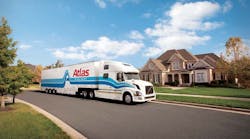Those who don't work for public utilities don't spend much time thinking about the fleets of vocational trucks they field. Until the lights go out. Then there's nothing they'd rather see than a lineman's truck with its welcome flashing yellow lights. Keeping work trucks in nothing less than tip-top, ready-to-work-under-all-conditions condition is the reason for being of the utility fleet.
But few are ever tested to the degree Florida Power & Light (FPL) was this year — when no less than three major hurricanes struck the heart of its 27,000-sq.-mi. service area in just six weeks.
Just eight days after Category 3 Hurricane Jeanne — the fourth Atlantic storm to bash the Sunshine State — made landfall, FPL reported it had restored power to the last of 1.7-million customers without.
To accomplish this and what it went through with Hurricanes Charley and Frances, FPL not only counted on its line crews, who operate 3,400 pieces of equipment, but also managed an enormous logistical operation to support its own workers, as well as those of other utilities and contractors brought in from out of state.
According to director of fleet services George Survant, having reliable equipment available 'round the clock is all in a day's work for FPL's truck operation.
“In a recovery operation,” says Survant, “we have to depend on an extremely reliable fleet capable of enabling our crews to expend the maximum effort.
“That's why,” he continues, “we spec our trucks to last 20 years, we maintain them to be fully reliable for at least 15 years, and we sell them after 11 or 12 years for the best resale.” Survant says FPL measures reliability in terms of mean days until failure, which currently stands at an impressive 176 days.
While Survant says how a truck is “built,” or spec'd, is important, he emphasizes the contribution of the fleet's ASE-certified technicians.
“We enjoy an exceptionally disciplined work force that is managed using predictive maintenance,” says Survant.
While the FPL fleet is squarely focused on being fully functional day after day, it is also far-sighted enough to be involved in future vehicle developments. Most recently, the fleet has taken a leading role in the birth of a utility-oriented diesel-electric hybrid medium-duty truck.
Survant chairs the utility working group within the HTUF (hybrid truck users' forum) organized by Calstart-Westart.
The upshot is FPL and some 30 other utility fleets have had a hand in designing a medium-duty International truck that uses Eaton's hybrid diesel-electric drive system. The first of these trucks will be rolled off an assembly line next year and FPL will be among the first utilities to put them into service
Why get involved with such technology? The first reason is FPL's commitment to environmental responsibility. The second involved recognizing “a truck is a tool that puts a man in the air to work off the ground for six or seven hours a day,” says Survant. “And with a hybrid system you end up with a cleaner, quieter and less expensive truck to operate.”
Light bulb!


